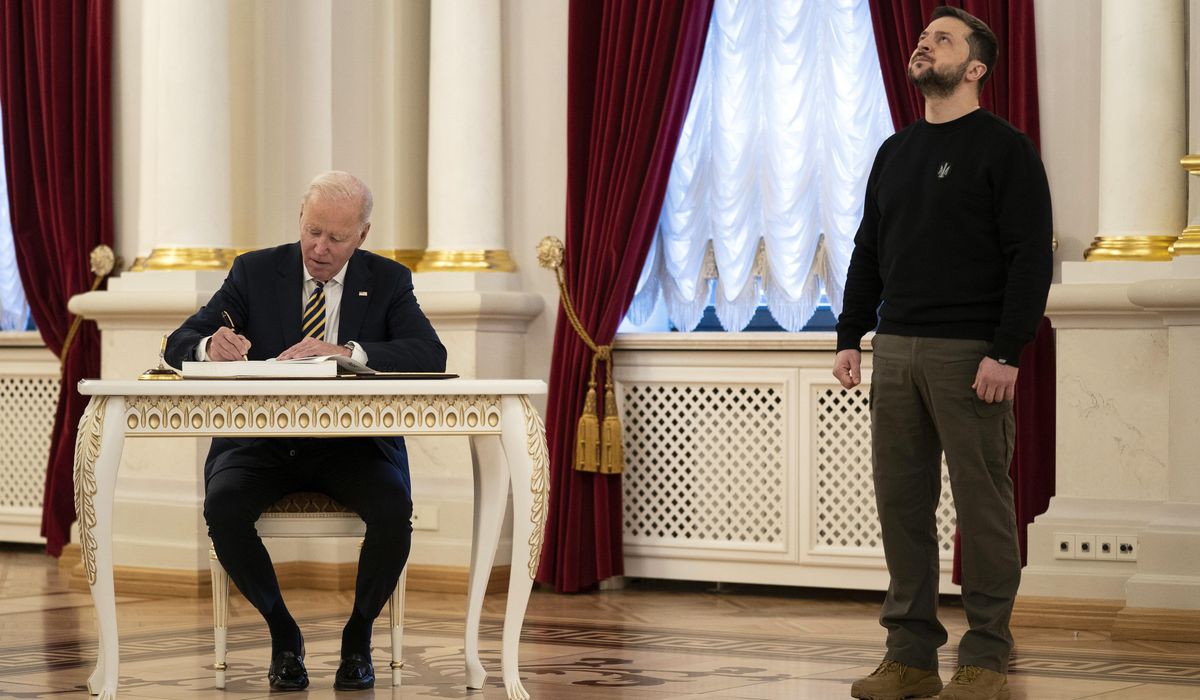How much money has the United States provided Ukraine as its war to fight off an invading Russian army nears the 22-month mark? Let us count the ways.
The math has become even more pressing as President Biden faces increasing resistance on Capitol Hill to his request for another $61.4 billion for Kyiv, with Ukrainian President Volodymyr Zelenskyy making a hastily arranged trip to Washington this week to make a personal plea to lawmakers for continued U.S. support.
Half of the new package would go to restocking the Pentagon’s own arsenals for the weapons, ammunition and other equipment to be sent to Ukraine’s forces, with the other half earmarked for intelligence support, humanitarian aid and assistance to Mr. Zelenskyy’s government for emergency response, development and other accounts.
What has already been sent to Ukraine — for defense, for humanitarian aid and for economic rebuilding — can also be parsed in many ways. The Council on Foreign Relations and the German-based Kiel Institute for the World Economy have compiled running tabs of the totals to date, as well as what has been pledged in the pipeline.
According to the CFR totals contained in a recent survey by Jonathan Masters and Will Merrow, U.S. bilateral aid to Ukraine between Jan. 24, 2022 — a month before the war began — and Oct. 31, 2023, totaled $75.4 billion, of which $46.3 billion (61%) was for weapons, equipment, grants for military purchases, training, logistics and other support.
The remainder of the funds was for humanitarian relief, including money for refugee support, and budgetary aid to Kyiv to help support the economy.
Ukraine has been by far the largest foreign recipient of U.S. military aid in that time, and even the new emergency defense request from the Biden White House for Israel is just a fifth of the $64 billion sought for Ukraine.
As it lobbies for congressional approval of the new aid, the administration has also been dipping into existing accounts at the Pentagon, including a $200 million military aid package Mr. Biden announced during Mr. Zelenskyy’s visit this week.
Some 47 countries around the world have provided military aid to Kyiv, but the Kiel Institute and Council on Foreign Relations numbers show that the U.S. through Oct. 31 was by far the biggest single source of support, with more than twice the total of Germany, the next largest donor.
The 27 nations of the European Union combined had committed through Oct. 31, 2023, just more than $80 billion in bilateral aid to Ukraine, slightly above the U.S. figure.
As a percentage of GDP, however, a number of states have provided more military, humanitarian and economic aid than the U.S., led by Norway and the Baltic states of Lithuania, Estonia and Latvia.
And with the status of U.S. support to Ukraine in question, Kiel Institute analysts say the European Union has surged past the U.S. in future pledges of aid, including a planned $53 billion support package through 2027 approved this summer.
“For the first time, the U.S. is now lagging behind by a large margin, also because there have been no meaningful new U.S. pledges over the past months,” said Kiel Institute Research Director Christoph Trebesch, head of the team producing the institute’s Ukraine Support Tracker. “The doubling of EU aid is a notable shift compared to the first year of the war, when the U.S. clearly led the way.”
The funding impasse also comes as a new report Wednesday suggested the Kremlin was poised to boost its own spending on the war.
Russian defense spending would rise sharply in 2024 under a new budget signed into law last month by President Vladimir Putin. The measure is a strong signal that Moscow is committed to continuing its two-year-old war against its smaller neighbor, according to an analysis by the Stockholm International Peace Research Institute.
The just-released SIPRI report estimates that Russia’s 2024 military budget — $140 billion — will be 29% higher than the year before. It means the Kremlin will earmark 35% of all government expenditures to military and war-related spending.
“With planned reductions in military spending in 2025-26 after a sharp increase in 2024, and with the Russian presidential election due in 2024, Putin appears to be showing his intent to bring the war to a successful conclusion within the year,” SIPRI Director Dan Smith said Wednesday.
The military hardware the U.S. has sent to Ukraine also covers the broad landscape of modern war, according to the Council on Foreign Relations report, including 100,000 Javelin and other anti-armor systems; a Patriot air defense battery and Hawk air defense systems; more than 250 155mm and 105mm Howitzers with ammunition; 20 Mi-17 helicopters; 168 Bradley infantry fighting vehicles and 31 Abrams tanks; combat and surveillance drones; 2,000 Humvees and over 1,000 tactical and light tactical vehicles; and two Harpoon coastal defense systems and 62 patrol boats.
Critics say the administration has cried wolf before on Ukraine funding, with the Pentagon finding new pots of money to keep the aid flowing. But the White House insists this time the shortfall is for real.
“I want to be clear: without congressional action, by the end of the year we will run out of resources to procure more weapons and equipment for Ukraine and to provide equipment from U.S. military stocks,” Shalanda Young, the director of the Office of Management and Budget, wrote last week to letter to Hill leaders. “There is no magical pot of funding available to meet this moment. We are out of money — and nearly out of time.”
𝗖𝗿𝗲𝗱𝗶𝘁𝘀, 𝗖𝗼𝗽𝘆𝗿𝗶𝗴𝗵𝘁 & 𝗖𝗼𝘂𝗿𝘁𝗲𝘀𝘆: www.washingtontimes.com
𝗙𝗼𝗿 𝗮𝗻𝘆 𝗰𝗼𝗺𝗽𝗹𝗮𝗶𝗻𝘁𝘀 𝗿𝗲𝗴𝗮𝗿𝗱𝗶𝗻𝗴 𝗗𝗠𝗖𝗔,
𝗣𝗹𝗲𝗮𝘀𝗲 𝘀𝗲𝗻𝗱 𝘂𝘀 𝗮𝗻 𝗲𝗺𝗮𝗶𝗹 𝗮𝘁 dmca@enspirers.com



